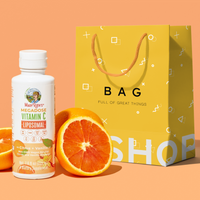FEATURED
BY COLLECTION
FIND MARYRUTH'S IN STORE!

STORE LOCATOR
Now you can find your all-time faves and discover some exciting new products while you're out shopping.
GET STARTEDLots of us have trouble getting a lot of protein in our diet, even if we are non-vegan or vegetarian.
But the myth that it is difficult to eat sufficient amounts of protein is even more persistent for vegans — meat and dairy products are not the only protein-rich foods available!
Simply put, proteins are made up of many amino acids, sometimes multiple thousands! While proteins can be very complex, it’s pretty amazing to note that there are only 20 different amino acid types that make up these structures
These are grouped into essential or nonessential amino acids. Essential amino acids are required, but cannot be made by our body on its own, whereas the body can make nonessential amino acids on its own either from the essential amino acids we consume or from glucose and a variety of nitrogen sources.
Protein is an essential macronutrient for our bodies. It has numerous purposes, including helping your body make and repair skin, tissue, and organs, and aiding in other body processes such as immune response, hormone production, fluid balance, and more.
It is also a component of every cell in our body and is found in many body fluids!
Our bodies are all different; this means that everyone’s specific protein needs may also be different! Since the recommended protein intake varies from person to person, it is important to be aware of what your specific body needs.
The USDA’s current basic protein recommendation is about 0.36 grams of protein per pound, but it is still not quite black and white. There are many factors that may affect your specific requirements such as your age, weight, daily activity level, whether you are pregnant or breastfeeding, or have other health conditions.
To figure out what is recommended for you, check out their handy Dietary Reference Intakes (DRIs) calculator and/or check with a physician or healthcare professional who may be able to provide more information
Did you know that even the USDA recommends that people eat more plant proteins more often?
Below are some of our favorite vegan-friendly proteins that you can eat for a great protein-rich diet!
Both cooked kidney beans (boiled, without salt) and cooked black beans (boiled, without salt) have approximately 7.5g of protein per ½ cup serving!
Chickpeas (boiled, without salt), also commonly referred to as garbanzo beans, are another source, with about 7g protein per ½ cup serving. Chickpeas are a great addition to any salad or stew, or can be made into delicious hummus with the help of some nutritious extra virgin olive oil and your favorite spices.
Lentils are hearty legumes with 9g of protein per ½ cup serving (cooked, boiled, without salt). Boiled lentils are great on their own, but they also go great with pasta, veggies, or in soups!
Peanuts (raw, all types) are not only an easy snack, but also have protein! One ounce has approximately 7g of protein. And if you’re more of a peanut butter person, you can find about 7g protein per 2 tbsp serving (smoothe style, without salt).
Roasted pumpkin and squash seeds (kernals, without salt) may have more protein than you’d think — a ¼ cup serving has just under 9g of protein. And although these are always great to have around Thanksgiving time, that doesn’t have to be the only time you eat these tasty seeds!
Sliced almonds are another great snack or nut choice to incorporate into your meals. By enjoying ⅓ cup of sliced almonds, you’ll consume about 6.5g of protein.
Don’t forget good ol’ veggies for some of your daily protein intake! Not all vegetables are created equally when it comes to protein content — some have more than others per serving.
Check out these veggie options:
If you’d like to add more protein to your diet in addition to that you’re receiving through your food, supplementing your protein intake with a quick and easy protein shake may be a great option!
Our Organic Vegan Chocolate Protein Powder, made from pumpkin seeds, is also dairy, whey, and grain free! Each serving (1 scoop) has 14g of protein. Talk about a great snack option!
Plus, you can use the protein powder to make your own tasty recipes loaded with even more protein, just like MaryRuth’s chewy chocolate chip muffins or yummy protein root beer float!
What’s great to remember is that when you’re eating your regular diet, it’s not uncommon for foods to provide more than just one part of your daily nutrient intake, as you can see above with the veggies! Keep a look out on all the other foods both in this list and in your daily routine to see if there are any other vitamins and minerals that you’re taking in through your regular diet.
You may even find that you’re able to provide your body with all of its recommended daily nutrients through your healthy daily diet! But if you find that your daily diet isn’t ticking all the boxes you’d like it to, we’re here to help you get all the vitamins and minerals your body craves and needs.
Health education made simple
your shopping bag